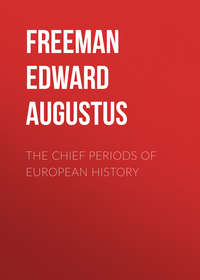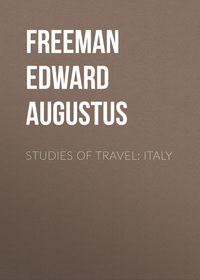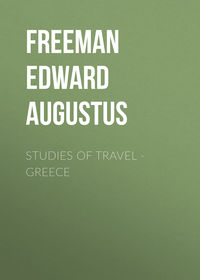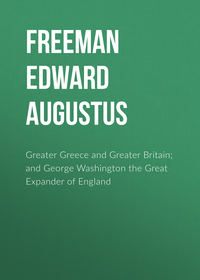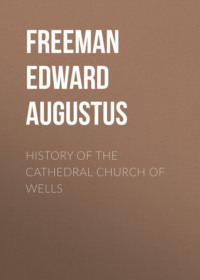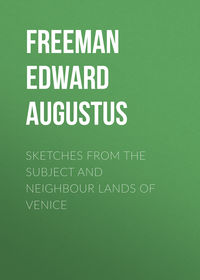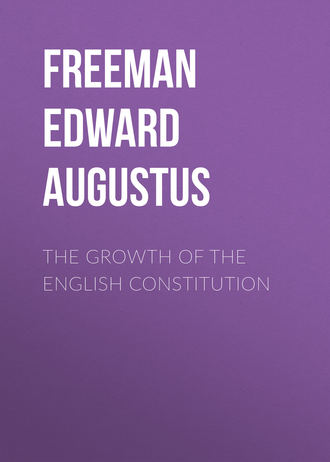 полная версия
полная версияThe Growth of the English Constitution

Edward A. Freeman
The Growth of the English Constitution / From the Earliest Times
The proverb “qui s’excuse s’accuse” is so regularly turned against any author who gives any account of the origin of his work that it may be well to prevent its quotation by quoting it oneself. I have to ask that these three Chapters and their accompanying Notes may not be judged by the standard of a book. If I were to write a book on the English Constitution, it would be different in form and, in many points, different in style. What the reader has here is a somewhat extended form of two Lectures given at Leeds and Bradford last January. I had thought that they might be worth printing in the shape of two magazine-*papers; others thought that they might do good in their present shape. I therefore expanded the latter part of the second Lecture, which had to be cut very short in delivery, so as to make a third Chapter, and I added such notes and references as seemed to be needed.
I say all this, in order that what I have now written may be judged by the standard of lectures, not by the standard of a book. In a popular lecture it is impossible to deal with everything with which it is desirable to deal; it is impossible to go to the bottom of those things which one picks out to deal with. It is enough – because it is all that can be done – if the choice of subjects is fairly well made, and if the treatment of those that are chosen, though necessarily inadequate, is accurate as far as it goes. Many things must be left out altogether; many things must be treated very imperfectly; the attention of the hearers must be caught by putting some things in a more highly wrought shape than one would choose at another time. The object is gained, if the lecturer awakens in his hearers a real interest in the subject on which he speaks, and if he sends them to the proper sources of more minute knowledge. If I can in this way send every one who wishes to understand the early institutions of his country to the great work of Professor Stubbs – none the less great because it lies in an amazingly small compass – my own work will be effectually done. In Mr. Stubbs’ “Documents Illustrative of English History,” the ordinary student will find all that he can want to learn; while he who means to write a book, or to carry out his studies in a more minute way, will find the best of guidance towards so doing. The great documents of early English history, hitherto scattered far and wide, are now for the first time brought together, and their bearing is expounded in a continuous narrative worthy of the unerring learning and critical power of the first of living scholars.
For my own part, my object has been to show that the earliest institutions of England and of other Teutonic lands are not mere matters of curious speculation, but matters closely connected with our present political being. I wish to show that, in many things, our earliest institutions come more nearly home to us, and that they have more in common with our present political state, than the institutions of intermediate ages which at first sight seem to have much more in common with our own. As the continuity of our national life is to many so hard a lesson to master, so the continuity of our political life, and the way in which we have so often fallen back on the very earliest principles of our race, is a lesson which many find specially hard. But the holders of Liberal principles in modern politics need never shrink from tracing up our political history to its earliest beginnings. As far at least as our race is concerned, freedom is everywhere older than bondage; we may add that toleration is older than intolerance. Our ancient history is the possession of the Liberal, who, as being ever ready to reform, is the true Conservative, not of the self-styled Conservative who, by refusing to reform, does all he can to bring on destruction. One special point on which I have dwelt is the way in which our constitutional history has been perverted at the hands of lawyers. It is perfectly true that the history of England must be studied in the Statute-Book, but it must be in a Statute-Book which begins at no point later than the Dooms of Æthelberht.
As I have often had need to take facts and doctrines for granted which I believe myself to have proved in my larger works, I have in the Notes given frequent references to those works, instead of bringing in the evidence for the same things over again. And in the more modern part of the subject, I have given several extracts at full length, even from very familiar authors, because I know that a reader is often well pleased to have a striking passage set before him at once, without having to seek for it in the original. On the other hand, I have given at full length several extracts from statutes and other documents which most readers are not likely to have at hand. The historical portions of any Act of Parliament can be studied only in the Acts themselves, and not in the summaries of lawyers. Legal writers and speakers seem constantly to repeat what has been said before them, without any reference to the original sources. A memorable example is to be found in the assertion of Blackstone and of a crowd of lawyers after him, in Parliament and out of Parliament, that the King or Queen is by Law Head of the Church. I need hardly say that that title was used by Henry, Edward, and Mary, but that it was given up by Mary, and was not taken up again by any later Sovereign.
Somerleaze, Wells,
March 25, 1872.
PREFACE TO THE SECOND EDITIONIn this Second Edition I have made a few verbal corrections and improvements, and I have made two or three additions to the Notes. Otherwise the book is unchanged.
Somerleaze, Wells,
October 30, 1872.
CHAPTER I
Year by year, on certain spots among the dales and the mountain-sides of Switzerland, the traveller who is daring enough to wander out of beaten tracks and to make his journey at unusual seasons may look on a sight such as no other corner of the earth can any longer set before him. He may there gaze and feel, what none can feel but those who have seen with their own eyes, what none can feel in its fulness more than once in a lifetime, the thrill of looking for the first time face to face on freedom in its purest and most ancient form. He is there in a land where the oldest institutions of our race, institutions which may be traced up to the earliest times of which history or legend gives us any glimmering, still live on in their primæval freshness. He is in a land where an immemorial freedom, a freedom only less eternal than the rocks that guard it, puts to shame the boasted antiquity of kingly dynasties, which, by its side, seem but as innovations of yesterday. There, year by year, on some bright morning of the spring-tide, the Sovereign People, not entrusting its rights to a few of its own number, but discharging them itself in the majesty of its corporate person, meets in the open market-place or in the green meadow at the mountain’s foot, to frame the laws to which it yields obedience as its own work, to choose the rulers whom it can afford to greet with reverence as drawing their commission from itself. Such a sight there are but few Englishmen who have seen; to be among those few I reckon among the highest privileges of my life. Let me ask you to follow me in spirit to the very home and birth-place of freedom, to the land where we need not myth and fable to add aught to the fresh and gladdening feeling with which we for the first time tread the soil and drink in the air of the immemorial democracy of Uri1. It is one of the opening days of May; it is the morning of Sunday; for men there deem that the better the day the better the deed; they deem that the Creator cannot be more truly honoured than in using, in His fear and in His presence, the highest of the gifts which He has bestowed on man. But deem not that, because the day of Christian worship is chosen for the great yearly assembly of a Christian commonwealth, the more directly sacred duties of the day are forgotten. Before we, in our luxurious island, have lifted ourselves from our beds, the men of the mountains, Catholic and Protestant alike, have already paid the morning’s worship in God’s temple. They have heard the mass of the priest or they have listened to the sermon of the pastor, before some of us have awakened to the fact that the morn of the holy day has come. And when I saw men thronging the crowded church, or kneeling, for want of space within, on the bare ground beside the open door, when I saw them marching thence to do the highest duties of men and citizens, I could hardly forbear thinking of the saying of Holy Writ, that “where the Spirit of the Lord is, there is liberty.” From the marketplace of Altdorf, the little capital of the Canton, the procession makes its way to the place of meeting at Böblingen. First marches the little army of the Canton, an army whose weapons never can be used save to drive back an invader from their land2. Over their heads floats the banner, the bull’s head of Uri, the ensign which led men to victory on the fields of Sempach and Morgarten. And before them all, on the shoulders of men clad in a garb of ages past, are borne the famous horns, the spoils of the wild bull of ancient days, the very horns whose blast struck such dread into the fearless heart of Charles of Burgundy3. Then, with their lictors before them, come the magistrates of the commonwealth on horseback4, the chief magistrate, the Landammann, with his sword by his side. The people follow the chiefs whom they have chosen to the place of meeting, a circle in a green meadow, with a pine forest rising above their heads and a mighty spur of the mountain range facing them on the other side of the valley. The multitude of freemen take their seats around the chief ruler of the commonwealth, whose term of office comes that day to an end. The Assembly opens; a short space is first given to prayer, silent prayer offered up by each man in the temple of God’s own rearing. Then comes the business of the day. If changes in the law are demanded, they are then laid before the vote of the Assembly, in which each citizen of full age has an equal vote and an equal right of speech. The yearly magistrates have now discharged all their duties; their term of office is at an end; the trust which has been placed in their hands falls back into the hands of those by whom it was given, into the hands of the sovereign people. The chief of the commonwealth, now such no longer, leaves his seat of office and takes his place as a simple citizen in the ranks of his fellows. It rests with the free will of the Assembly to call him back to his chair of office, or to set another there in his stead. Men who have neither looked into the history of the past, nor yet troubled themselves to learn what happens year by year in their own age, are fond of declaiming against the caprice and ingratitude of the people, and of telling us that under a democratic government neither men nor measures can remain for an hour unchanged. The witness alike of the present and of the past is an answer to baseless theories like these. The spirit which made democratic Athens year by year bestow her highest offices on the patrician Periklês and the reactionary Phôkiôn5 still lives in the democracies of Switzerland, alike in the Landesgemeinde of Uri and in the Federal Assembly at Bern. The ministers of Kings, whether despotic or constitutional, may vainly envy the sure tenure of office which falls to the lot of those who are chosen to rule by the voice of the people. Alike in the whole Confederation and in the single Canton reelection is the rule; the rejection of the out-going magistrate is the rare exception6. The Landammann of Uri, whom his countrymen have raised to the seat of honour, and who has done nothing to lose their confidence, need not fear that when he has gone to the place of meeting in the pomp of office, his place in the march homeward will be transferred to another against his will.
Such is the scene, which, save for a moment, when the world was turned upside down by the inroads of revolutionary France7, has gone on year by year as far as history goes back in the most unchanged of European states. Let me ask you to follow me yet again to the place of assembly of a younger member of the same noble band of commonwealths8, to pass from Uri to Appenzell, from the green meadows of Bözlingen to the hill-side market-place of Trogen. Somewhat of the pomp and circumstance which marks the assembly of Catholic and pastoral Uri is lacking in the assembly of the Protestant and industrial population of the Outer Rhodes of Appenzell. But the stamp of antiquity, the stamp of immemorial freedom, is impressed alike on the assembly and on the whole life of either commonwealth. We miss in Appenzell the solemn procession, the mounted magistrates, the military pomp, of Uri, but we find in their stead an immemorial custom which breathes perhaps more than any other the spirit of days when freedom was not a thing of course, but a thing for which men had to give their toil and, if need be, their blood. Each man who makes his way to the Landesgemeinde of Trogen bears at his side the sword which the law at once commands him to carry and forbids him to draw9. And in the proceedings of the assembly itself, the men of Appenzell have kept one ancient rite, which surpasses all that I have ever seen or heard of in its heart-stirring solemnity. When the newly chosen Landammann enters on his office, his first duty is to bind himself by an oath to obey the laws of the commonwealth over which he is called to rule. His second duty is to administer to the multitude before him the same oath by which he has just bound himself. To hear the voice of thousands of freemen pledging themselves to obey the laws which they themselves have made is a moment in one’s life which can never be forgotten, a moment for whose sake it would be worth while to take a far longer and harder journey than that which leads us to Uri or Appenzell.
And now I may be asked why I have begun a discourse on the constitution of England with a picture of the doings of two small commonwealths whose political and social state is so widely different from our own. I answer that I have done so because my object is, not merely to speak of the constitution of England in the shape which the changes of fourteen hundred years have at last given it, but to trace back those successive changes to the earliest times which either history or tradition sets before us. In the institutions of Uri and Appenzell, and in others of the Swiss Cantons which have never departed from the primæval model, we may see the institutions of our own forefathers, the institutions which were once common to the whole Teutonic race, institutions whose outward form has necessarily passed away from greater states, but which contain the germs out of which every free constitution in the world has grown. Let us look back to the earliest picture which history can give us of the political and social being of our own forefathers. In the Germany of Tacitus we have the picture of the institutions of the Teutonic race before our branch of that race sailed from the mouths of the Elbe and the Weser to seek new homes by the Humber and the Thames. There, in the picture of our fathers and brethren seventeen hundred years back, the free Teutonic Assembly, the armed Assembly of the whole people, is set before us, well nigh the same, in every essential point, as it may still be seen in Uri, Unterwalden, Glarus, and Appenzell. One point however must be borne in mind. In the assemblies of those small Cantons it is only the most democratic side of the old Teutonic constitution which comes prominently into sight. The commonwealth of Uri, by the peculiar circumstances of its history, grew into an independent and sovereign state. But in its origin it was not a nation, it was not even a tribe10. The Landesgemeinden of which I have been speaking are the Assemblies, not of a nation but of a district; they answer in our own land, not to the Assemblies of the whole Kingdom, but to the lesser Assemblies of the shire or the hundred. But they are not on that account any the less worthy of our notice, they do not on that account throw any the less light on that common political heritage which belongs alike to Swabia and to England. In every Teutonic land which still keeps any footsteps of its ancient institutions, the local divisions are not simply administrative districts traced out for convenience on the map. In fact, they are not divisions at all; they are not divisions of the Kingdom, but the earlier elements out of whose union the Kingdom grew. Yorkshire, by that name, is younger than England, but Yorkshire, by its elder name of Deira, is older than England11. And Yorkshire or Deira itself is younger than the smaller districts of which it is made up, Craven, Cleveland, Holderness, and others. The Landesgemeinde of Uri answers, not to an Assembly of all England, not to an Assembly of all Deira, but to an Assembly of Holderness or Cleveland. But in the old Teutonic system the greater aggregate was simply organized after the model of the lesser elements out of whose union it was formed. In fact, for the political unit, for the atom which joined with its fellow atoms to form the political whole, we must go to areas yet smaller than those of Holderness or Uri. That unit, that atom, the true kernel of all our political life, must be looked for in Switzerland in the Gemeinde or Commune; in England – smile not while I say it – in the parish vestry12.
The primitive Teutonic constitution, the constitution of the Germans of Tacitus, the constitution which has lingered on in a few remote corners of the old German realm, is democratic, but it is not purely democratic. Or rather it is democratic, purely democratic, in the truer, older, and more honourable sense of that much maligned word; it is not purely democratic in that less honourable, but purely arbitrary, sense which is often put upon it in modern controversy. Democracy, according to Periklês, is a government of the whole people, as opposed to oligarchy, a government of only a part of the people13. A government which vests all power in any one class, a government which shuts out any one class, whether that class be the highest or the lowest, does not answer the definition of Periklês; it is not a government of the whole but only of a part; it is not a democracy but an oligarchy14. Democracy, in the sense of Periklês, demands that every freeman shall have a voice in the affairs of the commonwealth; it does not necessarily demand that every freeman should have an equal voice. It does not forbid the existence of magistrates clothed with high authority and held in high reverence, nor does it forbid respect for ancient birth or even an attachment to an hereditary line of rulers. The older school of English constitutional writers delighted to show that the English Constitution contained a monarchic, an aristocratic, and a democratic element, the three being wrought together in such true and harmonious proportion that we could enjoy the good side of all the three great forms of government without ever seeing the evil side of any of them. These worthy speculators were perhaps a little Utopian in their theories; still there is no doubt that, in every glimpse we get of old Teutonic politics, we see what we may fairly call a monarchic, an aristocratic, and a democratic element. Those earliest glimpses set before us three classes of men as found in every Teutonic society, the noble, the common freeman, and the slave15. The existence of the slave, harshly as the name now grates on our ears, is no special shame or blame to our own forefathers. Slavery, in some shape or other, has unhappily been the common law of most nations in most ages; it is a mere exception to the general rule that, partly through the circumstances of most European countries, partly through the growth of humanity and civilization, the hateful institution has, during a few centuries past, gradually disappeared from a certain portion of the earth’s surface. And we must not forget that, in many states of society, the doom of slavery may have been thankfully received as an alleviation of his lot by the man whose life was forfeited either as a prisoner in merciless warfare or as a wrong-doer sentenced for his crimes16. But I mention the existence of slavery only that we may remember that when we speak of freedom, freeman, democracy, and the like, we are after all speaking of the rights of a privileged class – that, whether in Athens, in Rome, or in the early Teutonic communities, there was always a large mass of human beings who had no share in the freedom, the victory, or the glory of their masters. We are now more closely concerned with those distinctions which, from the earliest times, we find among the freemen themselves. In the Germany of Tacitus, as at this day in the democratic Cantons, the sovereign power is vested in the whole people, acting directly in their own persons. But if the sovereignty of the popular Assembly is plainly set before us, we have also no less plainly set before us the existence of a Council smaller than the popular Assembly, and also the existence of a class of nobles, the nature and extent of whose privileges is not very well defined, but who clearly had privileges of some kind or other, and whose privileges passed on by hereditary descent. Here we have an aristocratic element as distinctly marked as the democratic element which is supplied by the popular Assembly. And at the head of all we see personal chiefs of tribes and nations, chiefs bearing different titles, Kings, Dukes, or Ealdormen, who in most cases drew their title to rule from an union of birth and election, rulers whom the nation chose and whom the nation could depose, but who still were the personal leaders of the nation, its highest magistrates in peace, its highest leaders in war. Here then, besides the democratic and the aristocratic elements, we have a distinct monarchic element standing out clearly in our earliest glimpses of Teutonic political life. King, Lords, and Commons, in their present shapes, are something comparatively recent, but we may see something which may fairly pass as the germ of King, Lords, and Commons, from the very beginning of our history.
I will even go a step further. The Constitution which I have just sketched is indeed the common possession of the Teutonic race, but it is something more. We should perhaps not be wrong if we were to call it a common possession of the whole Aryan family of mankind. It is possible that we may even find traces of it beyond the bounds of the Aryan family17. But I will put speculations like these aside. It is enough for me that the Constitution which was the common heritage of the Teutonic race, was an heritage which the Teuton shared with his kinsfolk in Greece and Italy. Turn to the earliest records of European civilization. In the Homeric poems we see a constitution, essentially the same as that which is set before us in the Germany of Tacitus, established alike in the Achaian camp before Ilios, in the island realm of Ithakê, and even among the Gods on Olympos. Zeus is the King of all; but he has around him his Council of the greater Gods, and there are times when he summons to his court the whole Assembly of the Divine nation, when Gods of all ranks gather together in the court of their chief, when, save old Ocean himself, even all the River-gods were there, and when we are specially told – a fact which might perhaps be pressed into the service of very recent controversies – that not one of the Nymphs stayed away18. If we come down to earth, we find the King of Men as the common leader of all, but we find him surrounded by his inner Council of lesser princes and captains. And on great occasions, Agamemnôn on earth, like Zeus in heaven, gathers together the general Assembly of freeborn warriors, an assembly in which, if debate was mainly confined to a few eloquent leaders, the common freeman, the undistinguished citizen and soldier, had at least the right of speaking his mind as to the proposals of his chiefs, by loud applause or by emphatic silence19. Nor is this picture confined to the host in battle array beneath the walls of Ilios; we must remember that in all early societies the distinction between soldier and civilian is unknown; the army is the nation, and the nation is the army. The same picture which the Iliad sets before us as the constitution of the Achaian army is set before us in the glimpses of more peaceful life which we find in the Odyssey as being no less the constitution of every Hellenic commonwealth on its own soil. Everywhere we find the same three elements, the supreme leader or King, the lesser chiefs who form his Council, and the final authority of all, the general Assembly of the freemen20. We see the same in every glimpse which history or legend gives us of the political state of Rome and the other old Italian commonwealths21. Everywhere we find the King, the Senate, the Assembly of the people, and the distribution of powers is not essentially changed when the highest personal authority is transferred from the hands of a King chosen for life to the hands of Consuls chosen for a year22. The likeness between the earliest political institutions of the Greek, the Italian, and the Teuton is so close, so striking in every detail, that we can hardly fail to see in it possession handed on from the earliest times, a possession which Greek, Italian, and Teuton already had in the days before the separation, in those unrecorded but still authentic times when Greek, Italian, and Teuton were still a single people speaking a single tongue.


